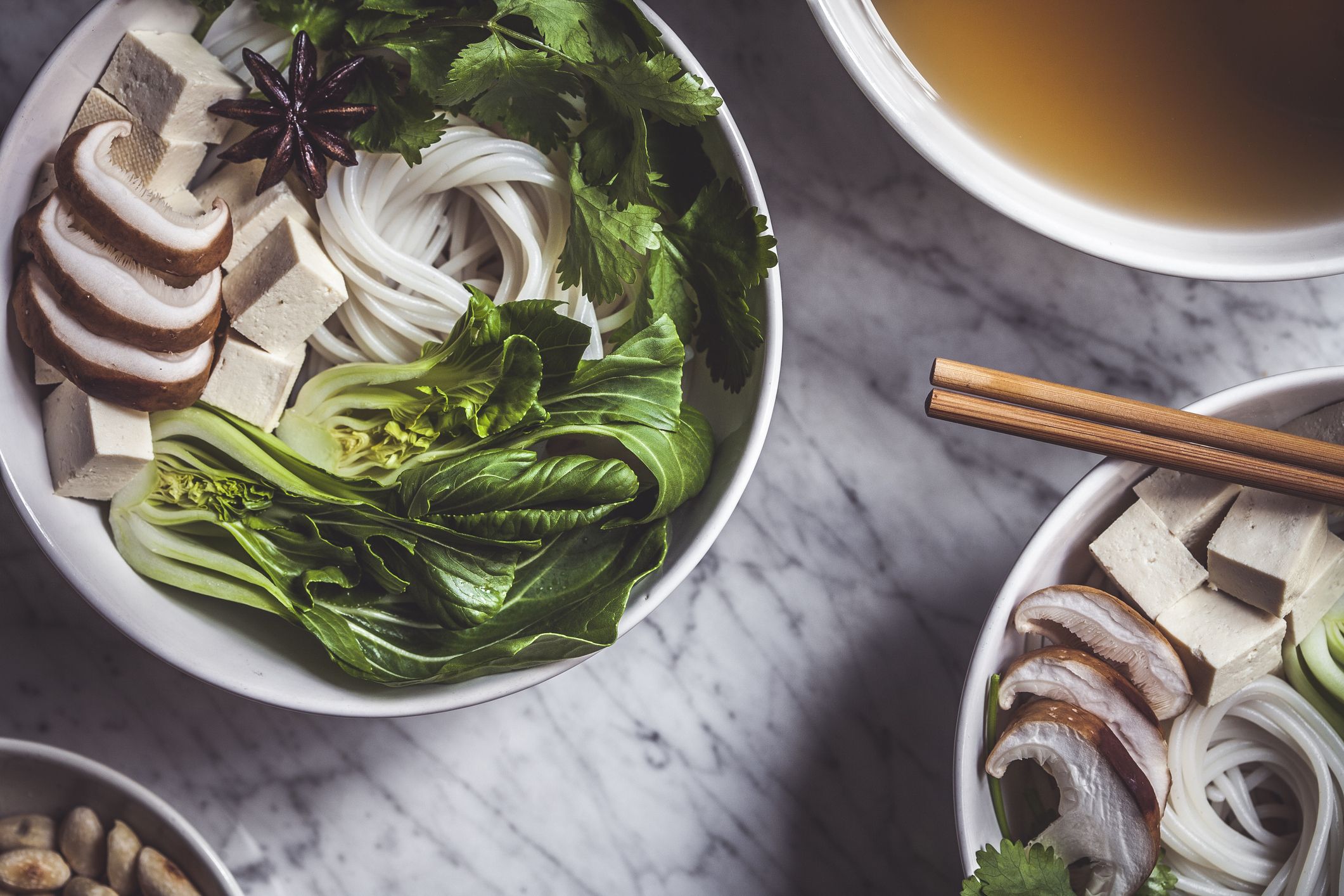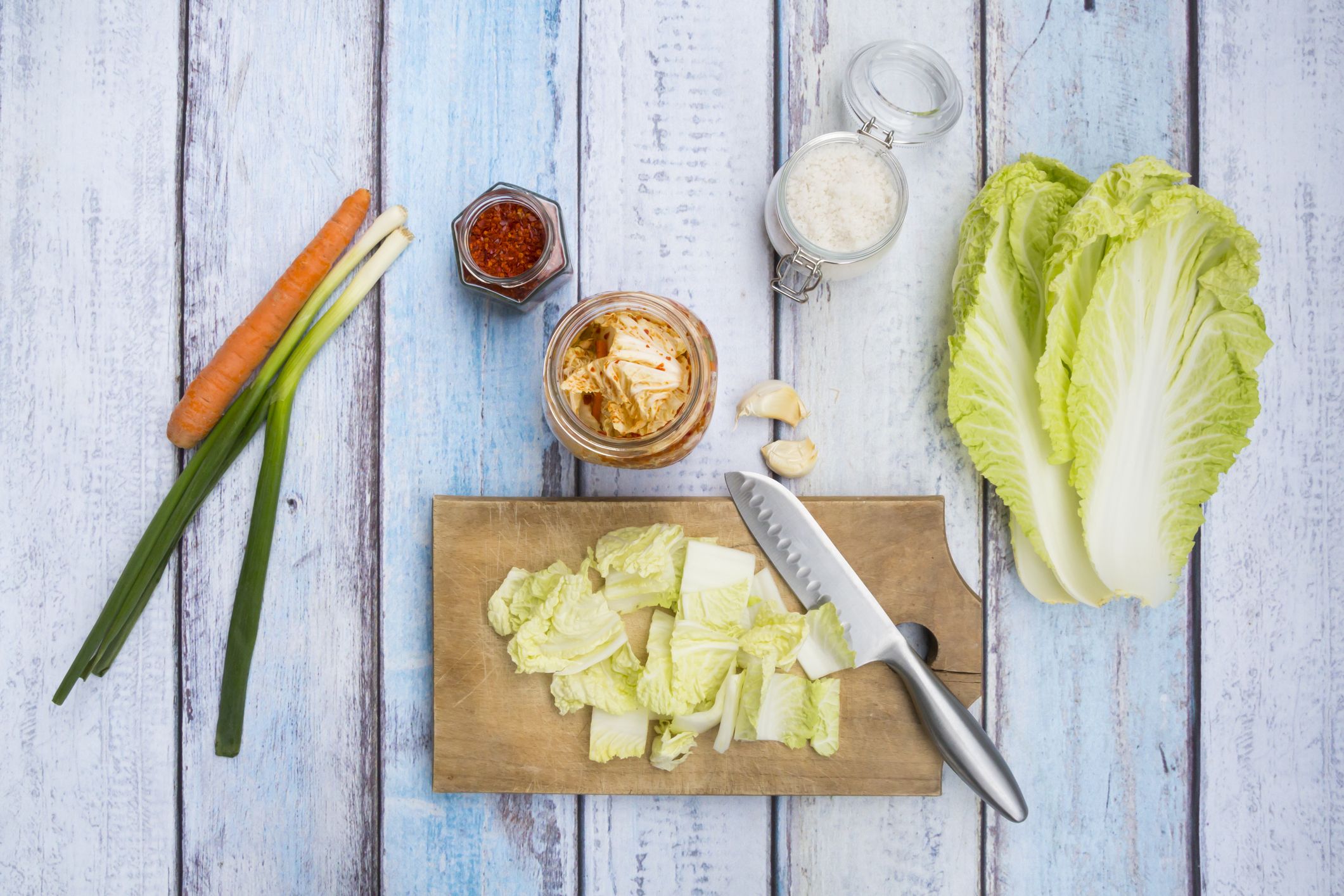10 Health Benefits of Kimchi, According To Nutritionists
Love spicy food? (Yes!) Want a healthier gut? (Uh, sure? Why not!)
Well, if you’ve seen jars of kimchi at the grocery store but never actually put one in your cart, know this: The traditional Korean dish offers numerous health benefits, for your stomach and beyond.
Typically, kimchi is made by fermenting cabbage and other vegetables with seasonings such as sugar, salt, onions, garlic, ginger, and chili peppers. “Essentially, it’s a Korean side dish of salted and fermented vegetables, including napa cabbage, radishes, and green onion,” says nutritionist Mia Syn, MS RD. “The process to make kimchi begins with brining or salting the vegetables to draw out the water, which aids in the preservation and allows the seasonings to easily penetrate. Then, the vegetables are fermented by lactic acid bacteria,” adds Syn.
A Korean culinary staple, kimchi originated over 3,000 years ago, according to Syn, as a preservation system to keep the food fresh for a long period of time. Mostly, people don’t follow a recipe for kimchi. They simply adding dashes of different spices in their homes in order to create various distinct flavors.
It’s been part of traditional Korean cuisine for health reasons, too: Fermented foods like kimchi are an easy, low-calorie way to up your vegetable intake and load up on gut health-boosting bacteria (a.k.a. probiotics). That’s why Women’s Health is putting the spicy stuff front and center. Read on for more about the nutrition wins kimchi has to offer, and how you can DIY your own jar at home.
Kimchi serves up tons of health benefits.
Along with its spicy kick come a number of impressive health perks. Seriously, you might want to pick yourself up a jar (or two).
1. It’s good for your gut.
“Like other fermented veggies and foods, kimchi is rich in beneficial probiotics,” explains New York City-based dietitian Samantha Cassetty, RD. These good-for-you bacteria have been linked with many health benefits, all of which start in the digestive tract.

Eating kimchi can help improve the balance of bacteria in your gut, ultimately benefiting your gut health by aiding smooth digestion, adds Alissa Rumsey, RD, nutrition therapist and owner of Alissa Rumsey Nutrition and Wellness.
2. Kimchi might boost your immune health.
No shocker here: Kimchi’s digestive benefits carry over to your immune system, too. The probiotics in kimchi are “beneficial for immune function because the majority of immune function takes place in the gut,” says Jessica Cording, RD, author of The Little Book of Game-Changers: 50 Healthy Habits For Managing Stress & Anxiety. When your gut microbiome (a.k.a. that healthy balance of bacteria) is in good shape, your immune system is better able to function optimally, she says.
3. It may help lower your cholesterol.
Though the exact link between kimchi and cholesterol isn’t totally clear, several studies have found that people who eat kimchi regularly tend to have lower levels of “bad” (LDL) cholesterol. “Scientists aren’t sure which ingredients in kimchi, exactly, are responsible,” says Rumsey. (Cabbage, hot red peppers, garlic, leeks, and ginger—some of the common ingredients used in kimchi—all offer potential health benefits in their own rights.)
4. Kimchi can improve your heart health.
In addition to supporting healthy cholesterol, kimchi can also do your heart good by upping the levels of antioxidants in your body, thanks to ingredients like ginger and hot red peppers, says Cassetty. “Antioxidants help stabilize damaged cells that can accelerate the disease process, so having a high antioxidant status can protect you from chronic conditions, like heart disease,” she explains.
5. It may help with inflammation.
Excess or chronic inflammation takes a serious toll on your health over time, and probiotics (like you’ll find in kimchi) “can have an anti-inflammatory effect on the gut,” Cassetty says. In fact, one animal study published in the Journal of Microbiology found that a specific strain of probiotic found in kimchi reduced several markers for inflammation in the gut.
6. Kimchi can support brain health.
Another indirect result of a healthy gut: a better-working brain. “Keeping the digestive system healthy is also important for the brain, because the enteric nervous system, located in the gut, communicates with your brain,” Cording says. This gut-brain connection requires a healthy gut to function properly. And because kimchi is nourishing your gut, it’s therefore a brain-booster, too.
7. Kimchi might even help with weight loss.
Okay, obviously eating kimchi won’t magically make you drop pounds. However, it can be a really helpful tool in your healthy lifestyle. “Kimchi is a flavorful, low-calorie option,” Cassetty says. People tend to overeat when their food is boring or bland, but not when foods have significant spice in them. “When you add flavorful elements like kimchi to meals, it’s easier to feel satisfied with a healthier portion size,” she explains.
8. Kimchi supports eye health.
“Kimchi is a good source of beta carotene antioxidants,” says Syn. That’s especially thanks to the main ingredient: cabbage. “Our body converts this to vitamin A, which is important for vision and eye health.” Beta carotene has been linked to better eye health, especially as we age, and is one of the most important nutrients when it comes to eyesight.
9. It may help prevent yeast infections.
“The probiotics in kimchi could help prevent yeast infections,” says Syn. The yeast infections you might be most familiar with occur when the Candida fungus (which is normally harmless) multiplies rapidly inside the vagina. However, certain studies have suggested that certain strains of the good bacteria found in kimchi have the antimicrobial properties to actually fight yeast infection-causing fungus, thereby reducing the likelihood of developing the infection.
10. Kimchi can potentially lower your blood sugar.
A small study conducted with pre-diabetic participants revealed better glucose toleranceafter the study participants ate a fermented kimchi-containing diet for a minimum of 8 weeks. This suggests that kimchi can actually help decrease insulin resistance and improve glucose metabolism. If you’re a fan of sugary sweets, it may be beneficial to add some kimchi to your diet, so that your blood sugar doesn’t keep fluctuating (and you know…lead to a nasty energy crash).
Awesome! Are there any downsides to eating kimchi?
Traditional kimchi tends to pack serious heat—and that can be an issue for some people. “If you’re sensitive to spice, either use just a little bit or look for versions with less heat,” Rumsey says.
Also worth noting: According to Cassetty, that spiciness can also trigger acid reflux in people who are prone to it.

Plus, some people may experience bloating after eating fermented foods—and considering kimchi is made with cabbage (another known bloat-inducer), it can spell trouble for people who get gassy easily, Cassetty points out.
Finally, just keep in mind that many kimchi products contain plenty of sodium, so keep your portions in check to keep from going overboard on the salt.

Got it. So how do I make kimchi myself?
You can find kimchi in lots of local grocery stores these days (check the refrigerated section), but you can also make it at home if you prefer to DIY. Though every recipe is slightly different, kimchi is generally made with Chinese cabbage, salt, water, garlic, ginger, sugar, fish sauce, red pepper flakes, daikon radish, and scallions.
Basically, you chop up the cabbage, combine it with the other ingredients in a bowl, pack and seal it in a jar, and let it ferment at room temperature for a few days. From there, store it in the fridge.
Not sure where to start? Try this simple kimchi recipe.
How to eat ALL the kimchi, healthfully.
Lucky for your gut, kimchi is pretty versatile and can add heat to all sorts of savory dishes.
Cording recommends using it as a topper on salads and vegetable dishes and adding it into stir-fries. It also adds delicious flavor to soups, grain bowls, and eggs, Rumsey adds. Heck, you can even use it to punch up a burger.
Of course, you have full permission to also just eat it straight out of the jar when you’re craving a little spiciness…
Source: Read Full Article
